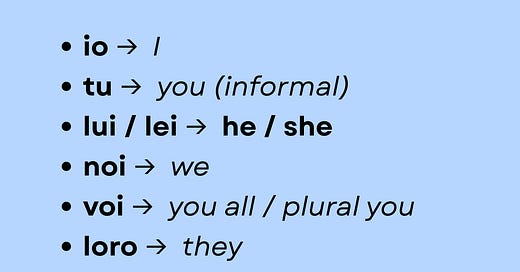You’re Using Italian Pronouns Wrong: Here’s How to Fix It
Why Italians Drop Pronouns and How You Can Too
If you’re learning Italian, pronouns are one of those essentials you can’t avoid. But the good news? Italian often lets you drop them entirely. Seriously.
Let’s explore how Italian subject pronouns work and when you actually need to say them out loud.
So, what are subject pronouns?
You already know them in English: I, you, he, she, we, you (plural), they.
In Italian, they’re:
io – I
tu – you (informal)
lui / lei – he / she
noi – we
voi – you all / plural you
loro – they
A few quick notes:
"Tu" is what you use with friends, family, and anyone you’d call by first name.
"Lei" (with a capital L) is the formal “you,” even though it also means “she.” Context will tell you which one is meant.
"Voi" is the go-to for groups of people — your friends, your classmates, your tour group.
"Loro" works for both masculine and feminine "they."
Why Italian often skips subject pronouns
Here’s where things get cool: in Italian, you can usually drop the subject pronoun. Why? Because the verb endings already tell you who’s doing the action.
Let’s take a look:
(Io) parlo italiano → Parlo italiano. (I speak Italian.)
(Tu) studi spagnolo? → Studi spagnolo? (Do you study Spanish?)
(Lui) lavora in banca → Lavora in banca. (He works in a bank.)
(Lei) abita a Roma → Abita a Roma. (She lives in Rome.)
(Noi) viviamo a Milano → Viviamo a Milano. (We live in Milan.)
(Voi) andate al cinema? → Andate al cinema? (Are you all going to the movies?)
(Loro) mangiano spesso fuori → Mangiano spesso fuori. (They often eat out.)
See how smooth and efficient that sounds?
But sometimes you DO say the pronoun — here’s when
There are a few moments when Italian speakers do use subject pronouns:
For emphasis
To clarify who you’re talking about, especially if there’s ambiguity
Examples:
Io voglio un gelato! (I want an ice cream!) → Emphasizing that I, not someone else, want it.
Tu devi studiare di più. (You need to study more.)
Lui è sempre in ritardo. (He is always late.)
Lei lavora in un ufficio, lui lavora da casa. (She works in an office, he works from home.)
Noi preferiamo la pizza alla pasta. (We prefer pizza over pasta.)
Voi avete finito i compiti? (Have you all finished your homework?)
Loro non vogliono venire alla festa. (They don't want to come to the party.)
Pronouns here aren’t necessary — but they add flavor and clarity.
Quick tip: “Lei” as a formal “you”
This one can be confusing at first. When you're being polite — say, talking to a stranger or your boss — use "Lei" instead of "tu."
Tu sei italiano? (Are you Italian? – Informal)
Lei è italiano? (Are you Italian? – Formal)
It’s capitalized when used formally to distinguish it from “lei” meaning “she.”
Speaking to more than one person? Use “voi”
Let’s say you walk into a room and ask your friends:
Voi studiate italiano? (Do you all study Italian?)
Ragazzi, voi siete pronti? (Guys, are you ready?)
No need to overthink it — voi is your go-to for addressing any group.
“Loro” — They’re doing something
When you’re talking about other people (not including yourself or the listener), loro is what you need:
Loro parlano inglese. (They speak English.)
Loro abitano in Francia. (They live in France.)
Again, you can usually drop it: “Parlano inglese.”
Want to practice? Try these quick exercises.
Fill in the blank with the correct pronoun:
__ sono americano. (I am American.)
__ sei uno studente? (Are you a student?)
__ vive a Milano. (He/She lives in Milan.)
__ andiamo in vacanza. (We’re going on vacation.)
__ siete insegnanti? (Are you (plural) teachers?)
__ parlano tre lingue. (They speak three languages.)
Now rewrite these without the subject pronoun:
Io studio italiano → ____________________
Tu lavori a Roma? → ____________________
Noi mangiamo la pizza ogni sabato → ____________________
Final Thoughts
Learning to drop pronouns in Italian is like a secret doorway to sounding fluent. It’s a small trick that makes your speech smoother and more natural — like a native.
But knowing when to use them for emphasis or clarity? That’s where you show finesse.
Try this: Have a mini conversation with yourself in Italian. Challenge yourself to leave out pronouns unless they really matter. You’ll be surprised how quickly it becomes second nature.
Buono studio — and buon divertimento! 🇮🇹




